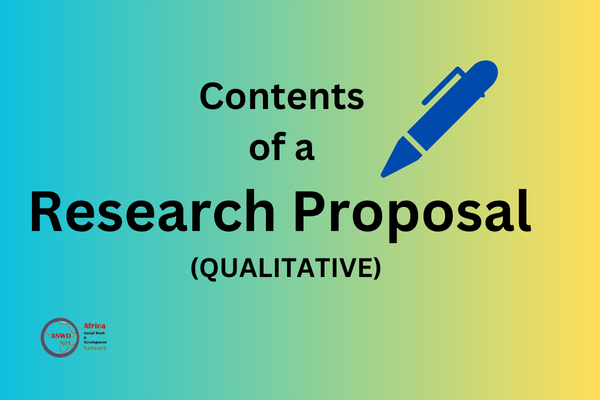
Contents of a Research Proposal (Qualitative)
A research proposal is used to plan and communicate what the research is going to do, why, how, and with whom.
| Section | Description | Example from a research proposed in Senegal |
|---|---|---|
| Title | Clearly states what the research is going to be about. | Exploring the educational transitions of Wolof-speaking migrant youth in Senegalese urban schools |
| Introduction | Introduces the topic, its significance, and relevance. | This study investigates how Wolof-speaking migrant youth adapt to formal schooling in Senegal. |
| Background | Provides context and literature informing the study. | Senegal’s education system promotes French, creating barriers for Wolof-speaking youth. |
| Philosophy (e.g. Ubuntu) | States the values guiding the research. | Grounded in Ubuntu values—justice, reciprocity, and ujamaa (communalism). |
| Theory and Theoretical Framework | A theory (single concept) or theoretical framework (combined ideas) used to interpret the study. | Uses Diopian theory and Ubuntu philosophy to analyse youth transitions. |
| Aims and Objectives | Clarifies why the research is undertaken and what it hopes to achieve. | Aim: Understand school transitions. Objective: Identify cultural barriers and support mechanisms. |
| Research Questions | Key questions the study seeks to answer. | What are the experiences of Wolof-speaking migrant youth in urban schools? |
| Positionality/Reflexivity | Researcher’s social position and potential influence. | As a Wolof speaker, I share cultural identity, requiring reflexivity. |
| Methodology | The research approach and worldview. | A decolonial methodology using participatory, relational approaches. |
| Methods | Tools and techniques for data collection and analysis. | Youth-led photovoice, interviews, and indaba with parents and teachers, translated from Wolof to English. |
| Ethics | Procedures for informed, respectful, and safe research. | Guided by the San Code of Ethics. Ethics approved by AIEC; Phase 2 by UCAD ethics board. |
| Limitations and Strengths | Acknowledges study’s constraints and strong points. | Limited to one region, but community-led and language-based strengths. |
| Reporting of findings | How study findings will be reported and what will be reported | Research report containing findings arranged in categories, themes, narratives, stories, quotes, visuals, case studies or a combination of these. |
| Knowledge Translation/Dissemination Plan | How findings will be shared and used. | Via community forums, Wolof radio, policy briefs, and school reports. |
| Conclusion | Summarises the project’s intention and value. | This study will inform culturally grounded education policy in Senegal. |
Use the form below to subscibe to Owia Bulletin.
Discover more from Africa Social Work & Development Network | Mtandao waKazi zaJamii naMaendeleo waAfrika
Subscribe to get the latest posts sent to your email.


